|
Limitar tu búsqueda
[+–] Editorial
[+–] Fecha
[+–] Formato
[+–] Idioma
[+–] Tipo de documento
[+–] Tipo de recurso
|

|
|
The time pattern of remittances: evidence from mexican migrants
We explore the time pattern of remittances using data on return migrants from the Mexican Migration Project. Some of these return migrants have settled in the U.S. and are returning to Mexico to visit family and friends, whereas others are temporary migrants returning home after a working spell in the U.S. We find that the dollar amount remitted first increases with time spent in the U.S. to...
|
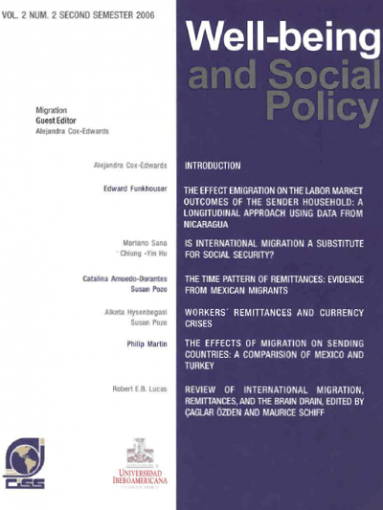
|
|
|
|

|
|
La Caja de Jubilaciones y Pensiones de Profesionales Universitarios - Régimen de seguridad social y convenios internacionales
Los profesionales universitarios, cuya raíz común estuvo dada por la Universidad de la República, que constituyó y constituye un sólido rasgo de identificación y unión, crearon un modelo de instituto, atendiendo a la índole y modalidad de su trabajo. Este régimen de seguridad social la doctrina lo identifica dentro del concepto de regímenes sustitutivos. La naturaleza jurídica de este nuevo...
|

|
|
|
|

|
|
El Hospital: Su prospectiva general
Estudiar la evolución y la prospectiva del hospital permite identificar retos, oportunidades y problemas del mismo y favorecer el conocimiento de sus aspectos médicos, administrativos, económicos, legales y éticos; al respecto, vale recordar que la prospectiva ha sido identificada como una ciencia que intenta un conocimiento del futuro basado en el futuro mismo, no en el pasado, de modo que se...
|

|
|
|
|

|
|
The impact of HIV/AIDS on social safety nets: What can the Caribbean expect?
In many ways mankind is at a defining moment in its history and this has come about because of a disease condition called HIV/AIDS. The truth is that the total number of persons living with HIV/AIDS now stands at more than an estimated 36.1 million. This reflects an increase of 2.5 million in the year 2000. A similar story holds in the case of the Caribbean where one source states that “more new...
|

|
|
|
|

|
|
Accidentes de trabajo: América del Sur y Central
Se presentan resultados de la investigación acerca de los problemas en la esfera del seguro de accidentes de trabajo y de enfermedades profesionales a partir de una encuesta enviada a los países de la región. La encuesta identifica algunas señales y síntomas de la situación actual. A continuación se presentan comentarios acerca de esta inadecuada e insuficiente situación, finalizando con puntos...
|

|
|
|
|

|
|
Convenios bilaterales internacionales de seguridad social, acuerdos administrativos y convenio de seguridad social del Mercosur
El tema objeto de esta disertación se enfoca, en primer término, los aspectos de los convenios bilaterales internacionales de seguridad social, de los acuerdos administrativos y normas de desarrollo y, posteriormente, el análisis del Convenio Multilateral de Seguridad Social del Mercosur.
Conferencia pronunciada en Montevideo, en el marco del primer Seminario Internacional sobre "Aplicación de...
|

|
|
|
|

|
|
Los convenios de seguridad social y la Caja de Jubilaciones y Pensiones Bancarias. Aspectos conceptuales y prácticos
Conferencia pronunciada en Montevideo, en el marco del primer Seminario Internacional sobre "Aplicación de los convenios internacionales de seguridad social", celebrado del 12 al 15 de marzo de 2001.
|

|
|
|
|

|
|
Modelos de prevención y su aplicación en las reformas de seguridad social en América Latina
La prevención de riesgos de trabajo por mucho tiempo se ha considerado como una actividad de poca importancia o algo que implica elevados costos a las empresas o a las mismas instituciones, con resultados sumamente pobres. En la mayoría de los casos se ha pretendido, por medio de reglamentos y normas, aplicar medidas de prevención que disminuyan los accidentes y las enfermedades de trabajo y,...
|

|
|
|
|

|
|
Efectos sociales de las alternativas de reforma respecto al modelo de financiación de un sistema de seguridad social. Aplicación al caso latinoamericano
Cuando se tratan los regímenes de financiación de la seguridad social, la discusión solo parece contemplar dos posibles alternativas entre capitalización y reparto, en muchas ocasiones generándose la controversia en foros jurídicos o económicos sin la suficiente formación e información actuarial como para saber a ciencia cierta de qué se está hablando; es decir, se utilizan estos conceptos de...
|

|
|
|
|

|
|
La evolución reciente en los sistemas de seguridad social: hacia soluciones acordes con las posibilidades económicas y las necesidades sociales
Conferencia pronunciada en Buenos Aires, en el marco del Seminario "Evolución de las reformas de la seguridad social en América Latina" celebrado del 13 al 17 de noviembre de 2000.
|

|
|
|
|

|
|
Social security and inequality in Mexico: from polarization to universality
The article documents the failure of social security in Mexico as an instrument of social protection and evaluates possible reform strategies. It analyses the truncated coverage of these systems for the most vulnerable, the regressive incidence and horizontal inequities of public social security subsidies, and the consequences for old-age poverty and inequalities in basic health opportunities. It...
|
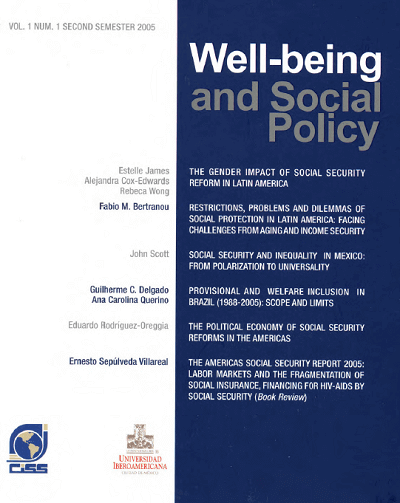
|
|
|
|

|
|
The effects of migration on sending countries: a comparison of Mexico and Turkey
International migrants are persons who cross national borders and remain outside their countries of birth or citizenship for 12 months or more, regardless of the reason for being abroad or legal status while abroad. According to UN estimates, the number of international migrants was 191 million in 2005, and half were in the labor force of the destination country. International labor migration...
|
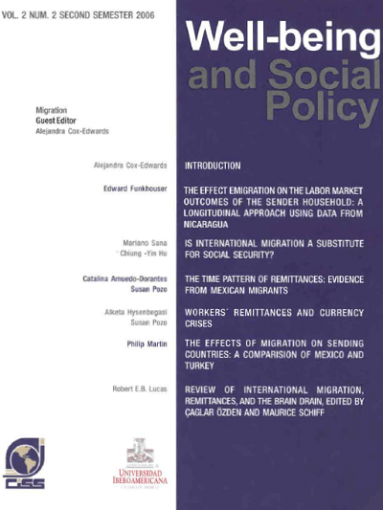
|
|
|
|

|
|
Workers' remittances and currency crises
We seek to further understand the factors that determine per emigrant remittances using data from 23 Latin American and Caribbean countries over the 1980-2003 period. We find that emigrants avoid remitting when the exchange rate is under pressure. This finding is consistent with the notion that remitters strive to reduce their exposure to exchange rate losses by taking into account the expected...
|
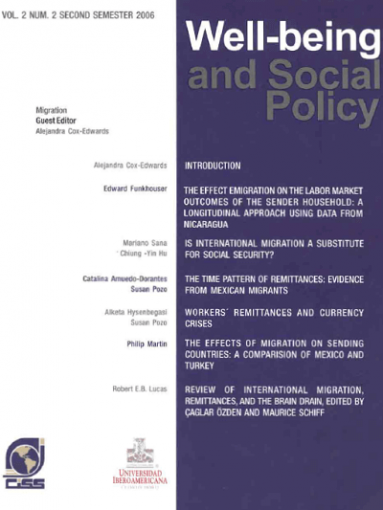
|
|
|
|

|
|
Review of International migration, remitances, and the brain drain, edited by Çaglar Özden y Maurice Schiff
As the volume title suggests, three of the studies deal with the effects of remittances on incomes and measures of well-being, four address various aspects of highly skilled migration, while the remaining paper examines the determinants of migration from rural Mexico to the US. Each of these is certainly topical: the rise in reported global remittance flows has been a major spur to the recent...
|
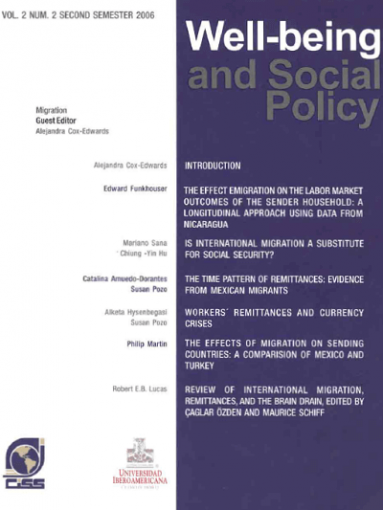
|
|
|
|

|
|
Is international migration a substitute for social security
The focus on short-term macroeconomic factors, including unemployment and wages, is insufficient to explain international migration. Institutional factors, bound to change only in the long run, can potentially have a large impact on migration flows. To illustrate this, we analyze Mexico-U.S. migration focusing on social security coverage, an important indicator of job formality. Using...
|
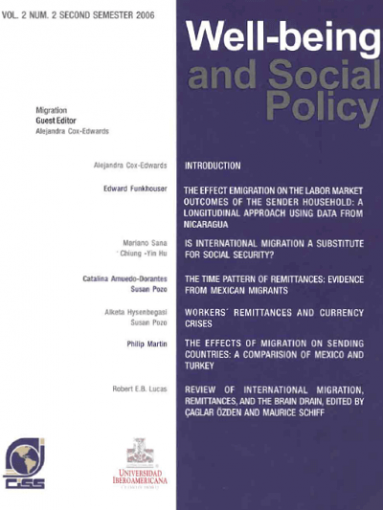
|
|
|
|

|
|
Catastrophic expenditure in health and income elasticities by item of expenditure in health services in Mexico
The objective of this article is to put in economic perspective the expenditure in health within the pattern of family expenditure of the Mexican households. Information of the National Survey on Income Expenditure of Households (ENIGH) of Mexico of 2004 is analyzed on: structure of the expenditure of the households, expenditure in health and income-expenditure elasticities in health; by...
|
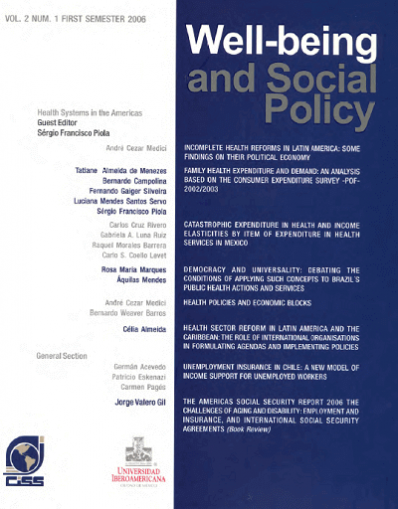
|
|
|
|

|
|
Provisional and welfare inclusion in Brazil (1988-2005): scope and limits
This paper analyses the influence of new rights derived from the Social Security System in Brazil after the Federal Constitution (1988). At least, three different and independent forces determinate the arrangements in social security policies: 1) the new social rights created by constitutional rules in response to social pressure; 2) the decrease of employment and wages in salaried jobs imposed...
|
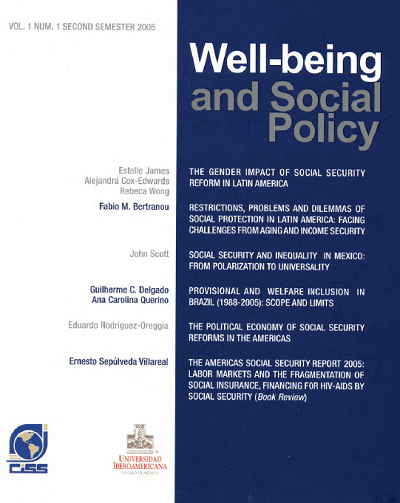
|
|
|
|

|
|
The political economy of social security reforms in the Americas
This paper analyses the factors affecting the decision to apply a reform (parametric and structural) in the Americas, which may hold a specific set of conditions, i.e. a sui generis political system and a high degree of economic openness, among others. Economic freedom is relevant in the case of structural reforms, while results for the share of older population are not conclusive. It may be that...
|
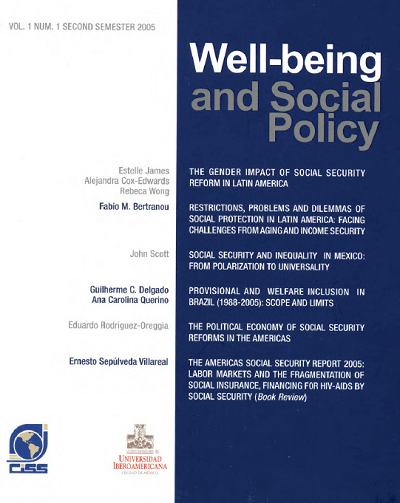
|
|
|
|

|
|
The effect of migration on the labor market outcomes of the sender household: a longitudinal approach using data from Nicaragua
In this paper, I use longitudinal data from the 1998 and 2001 Living Standard Measurement Surveys in Nicaragua to examine the impact of the emigration of household members on the household labor market integration and poverty. The main findings of the paper are that households from which an emigrant left had a reduction in members, a reduction in working members, a reduction in labor income than...
|
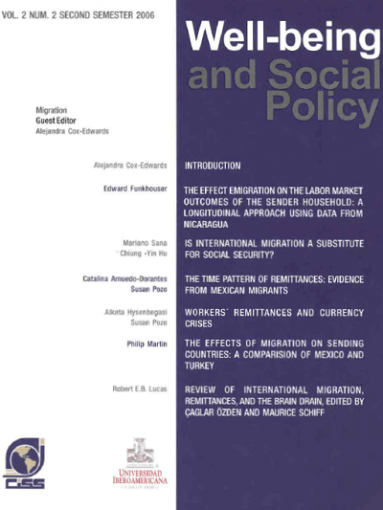
|
|
|
|

|
|
Incomplete health reforms in Latin America: some findings on their political economy
This paper raises the point that only few health reforms implemented in Latin American countries modified the existing health systems in order to fix the problems brought by the institutional fragmentation typical of this sector. A great part of these reforms did not implemented the necessary measures to improve coordination among health systems in the prevailing pluralistic model and besides,...
|
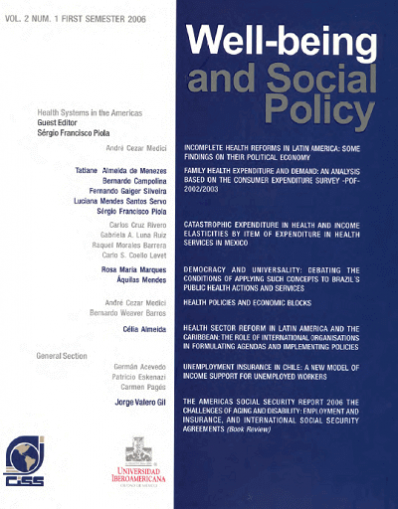
|
|
|
|
|